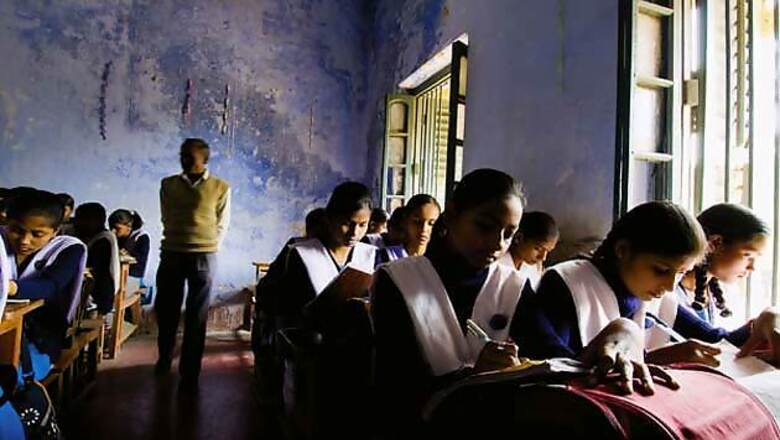
views
Mukesh Verma, my school friend, is our host. He suggests we go for a drive around the city at 9 p.m. (2100 hrs IST) after he shutters his jewelry shop. "Are you mad," I react instinctively. He assures me it's OK. We step out. I do not mention this to my dad when he calls. He has already called thrice during the day, every time asking me to be cautious.
We go for a city tour. Cutting through the traffic in the market, we are in the Fort area. It's quiet, the dark streets lined with thick trees, an eerie silence close to the Ganges. I am on edge. I blurt out: "Where are you going? Let's go back." Mukesh is cool. "We do this often. Don't worry." Going for a drive at night and indulging in some street food is the only way he can entertain his family in this city. And he is grateful he can do that now after so many years.
I am in Munger, my home town, after almost 15 years. This is where I went to school. This is where my dad once ran a successful business in the 1980s. About 200 km from Patna, it is a non-descript town once famous (rather infamous) for its gun factory, an ITC plant and a railway manufacturing unit.
Barely five years back, the roads wore a deserted look after dark, Mukesh recalls. Shops shut early. Girls would not step out in the evening. "Things have changed in the last three-four years. Nitish [Kumar, Bihar's CM] has really changed things," he says. Yet, I hesitate going alone to dinner at my teacher's house. I avoid stepping out of the car. The gun-totting men outside a temple we are visiting make me nervous.
I admit I have a hangover.
Flashback
In the 1980s, Munger was like any backward town in India. It was normal to have 20-hour power cuts and we had mastered the art of studying by kerosene lamps. Roads were poorly maintained; garbage dumps and open drains were common. Yet, life was exciting. A big family with five girls, we were a riot. We used to go for long early morning walks in the Fort area. We had our weekly outings - movie or dinner or both. Grand-dad got us our first bicycle. We soon persuaded dad to buy us mopeds. We became famous as "moped girls" - girls there didn't do such things then.
By 1989, I would leave all this to move to Delhi for my college.
By the early 1990s, things had begun to change in Bihar. The state had a new "charismatic" chief minister in Laloo Yadav and his impact was beginning to show. Businessmen, including my dad, felt it first. My sisters needed an escort to go to the market or for tuitions. The family's weekly outings stopped. By the mid 1990s, kidnappings, ransom, theft had all surged. In 1998, when the Centre imposed central rule in Bihar it said it has "brought to an end a rule which gave Bihar 5,000 murders, 1,000 rapes, 2,500 kidnappings and 3,000 dacoities in a year".
Smart businessmen had begun to move out of the state, sending their sons to boarding schools, fearing kidnappings. My father with five daughters had begun to get threats too. He was looted once, attacked by a home-made bomb in a bustling market. A simple man, comfortable with the small town life, Delhi was too big and aggressive a place for him to move to. Relocation would entail financial insecurities, the shutting down of a flourishing business and worst of all, social dislocation. For a while, he dithered, hoping things might improve.
PAGE_BREAK
By the mid 1990s, all the kids were moved to Delhi schools. My parents shuttled between Delhi and Munger. By the late 1990s, my father gave up hope and moved to Delhi.
Even as a liberalised India progressed rapidly, Bihar's government machinery was failing at every level. Virtually every macro socio-economic indicator tells a grim story. It was - and remains - one of the poorest states with one of the lowest literacy rate and highest child mortality rate. Per capita income in Bihar stood at Rs. 9,765 in 2007-08, less than one-third the national average.
For an average middle class family like ours, perhaps the breakdown of law and order was the most visible. For the rest - schools, hospitals etc - private substitutes were available. However, I would hear stories from the city's DJ College, where I finished my Standard XI and XII in 1988.
Almost no teachers were hired through the Laloo-Rabri regime and stray appointments were largely political. For example, the chemistry department had only two lecturers (13 posts had been sanctioned) even as the number of students multiplied from 16 honours seats to 50. It was not unusual to have academic sessions delayed by two-three years.
"Classes were perpetually suspended," my teacher Gautam Mishra, who teaches at the college, tells me over dinner.
Winds of Change
We are driving from Patna to Munger. This is the first time I have ever travelled on these roads. The two-lane highways are smooth, though for a big city dweller used to eight-lane expressways, they seem narrow and congested. But almost everybody in the state is raving about how roads in Bihar have transformed.
"Nitish has changed the condition of the roads completely," gushes Patna-based Raman Jha who runs Super Travel Agency. In the last five years, his 12-car fleet has expanded to 30. His car rental business has grown 100 percent during the period. Earlier people would avoid roads at night. Not any more, he says.
Better law and order conditions have helped. For long distances like Patna to Bhagalpur (250 km), train used to be the best option. Now people prefer roads.
Travel time between Patna and Munger has come down from about seven hours to about 4 hours. Even city roads in Munger are well maintained.
The Asian Development Bank (ADB) has rated the road work in Bihar as one of the best. "The aim is that within the state you can reach from anywhere to Patna in six hours," says Pratyay Amrit, CMD, Bihar Rajya Pul Nirman Nigam. For example, Sitamarhi to Patna took 12 hours; now it takes just three. "By 2015, we want Bihar roads to be the best in the country," he says. Amrit is now preparing his company to bid for projects outside the state.
Government hospitals too are changing. In Munger Sadar Hospital, KC Singh, civil surgeon and superintendent, can feel it first hand. The hospital once wore a deserted look. Stray dogs roamed freely. "Today, at times we have so many patients that we can't handle," Singh says.
"I come here once in a while. Earlier I wouldn't have even peeped here," says Mridula Jha, a retired higher secondary school principal, who lives alone in the city. What's bringing back the patients is the improved facilities. From note-pads for doctors to ambulances and generators, the government is investing in hospital infrastructure. Hospitals are clean and better staffed with more doctors. At the Munger hospital facilities like x-ray, ultrasound and 15 pathological tests are free.
PAGE_BREAK
It's a similar story at the Baidyanath Girls High School (IX to XII Standard), Munger. The school had no teachers for many subjects. "No recruitment for 15 years had taken its toll," says Syeda Parveen, the principal. Out of the 45 teachers that they have today, 30 have been hired on contract. The average class size has come down from 100 to 60 now. The number of girls too has gone up from 500 to 1,400 even as academic results show improvement.
Nitish's Magic Formula
How has Nitish Kumar managed Bihar's turnaround? Where the Laloo-RABRI government did nothing - or worsened things - for 15 years, even modest work by Kumar's government makes him look good. He has picked his battles well. Law and order, roads, healthcare and education - the four big thrust areas, have a broader relevance for the people, cutting across income and social class.
Of course, Kumar has tremendous motivation to deliver. His political career hinges on it. Unlike Laloo Yadav who became complacent, assured of loyal Muslim-Yadav votes (which gave him a 26 percent upfront edge over others), Nitish Kumar has no such loyal support base. Only his work will hold the key to his electoral fortunes, as the state prepares to go for election this year. And he knows it well.
Law and order is perhaps the biggest area of emphasis. The government sent a clear signal that political patronage of criminals has ended. "Bahubalis" (strongmen) like Shahabuddin were tried and jailed. "We monitored selected cases, irrespective of the parties, ensured evidence and speedy trial and punishment. It worked," says Amir Subhani, home secretary, Bihar government.
State policing infrastructure is being beefed up - from recruiting constable, sub inspectors to building police facilities like training academy, police stations (200 are under construction). After being neglected for years, the state's spend on law and order will touch Rs. 2,006 crore in 2009-10. Lawlessness had scared away many. For example road contractors would simply did not bid for Bihar projects. Under Nitish Kumar, any ransom call or threat was tackled on a war footing, says Amrit.
Nitish has picked his team of bureaucrats well. Amrit has overseen completion of 400-plus bridge projects. Once a loss-making state unit with Rs. 300-crore turnover, it is now a profitable enterprise with a turnover of Rs. 2,700 crore.
Use of technology, outsourcing and smart initiatives have enabled him to scale-up rapidly, improve quality and bring transparency. E-tendering has cut the 60-day process to 21. Smart devices like mobile inspectors - GPRS-enabled mobile phones - helped effective real time project monitoring.
Outsourcing and appointment on contract has been a consistent thread across different departments. It enables the government to do quick scale-up, offer flexibility for course correction and improve delivery.
PAGE_BREAK
Teachers, doctors and even retired policemen have been hired on contract. In hospitals, from generators, diagnostic facilities, X-ray machines, housekeeping, ambulances and even food has been outsourced to third parties who are paid depending on services delivered, with regular monitoring.
A Task Unaccomplished
Bihar is vastly better today than it was five years back. But perhaps it's still not good enough.
To me, Munger still looks like the city I left in 1989. Power cuts are severe; the city survives on invertors and generators. There's still just one good private school. While contract appointments in government schools and hospitals have kindled new hopes, private corporate investment is missing. Unemployment is a major problem. While schemes like NREGS may have held back the poor in the villages, the Bihari exodus continues. Malls, multiplexes, restaurants, hotels - the consumerist wave sweeping other parts of the country - are years away.
Munger is a microcosm of what Bihar and Nitish Kumar must be grappling with statewide. It has been surviving on funds provided by the Centre but it'll need to start attracting investments soon.
Electorates have a short memory. While contract appointments may have offered quick solutions, quality of service delivery will be an issue. Take contract teachers. They were hired on the basis of their degrees, but "they are product of the same corrupt regime where cheating in examination was rampant and degrees could easily be bought", says Jha.
Anjani Singh, principal secretary (HRD) agrees that quality of teachers is an issue, "But we knew it would have taken us 10 years to bridge the gap if went by the existing stiff norms." Now he is focusing on offering training and conducting annual screening test to vet their knowledge.
In the middle of all this, Nitish is becoming hamstrung by electoral politics in an election year. Already there is infighting within his party, with the party chief Lalan Singh resigning. He has flagged the issue of internal democracy, institutionalisation of the decision making process and collective leadership.
People say while Kumar may be a tenacious administrator with a vision, but he isn't a great team builder, is arrogant and insensitive. His reliance on a clutch of bureaucrats, critics aver, has cut him off from the masses, fuelling discontent within his own party.
The by-election results were an eye-opener. The reverses suffered by the JD(U) were more severe than those of its ally, the BJP. It doesn't help that the rival Congress, charged by Rahul Gandhi's charisma, is on the rebound.
While Kumar's government may have done a commendable job in bringing Bihar back on the growth path, he needs a re-election to consolidate his efforts.
Political experts say right now, the verdict isn't very clear. But every person I met during the four-day trip to Bihar - from rickshaw pullers to drivers, businessmen to immigrant Biharis - gave his four-year term a thumbs-up.
The Long Road Home
We are headed back to Delhi. Amit Verma, the photographer, and I are chatting about retirement. He wants to retire to Bikaner, his hometown in Rajasthan. I ponder. Munger just isn't an option. It is too small, remote and lacks even the basic amenities that I take for granted. Maybe Delhi, I mumble.
The very next day I get a call from a school friend. We connected after 25 years. He works at Stanford in the US. We talk for hours, catching up with each other. Then he says, "I want to return some day to Bihar and teach. I want to give back."
The cynic in me brands it as the romantic moorings of a home-sick Bihari. Promptly, the optimist in me nudges. At least people have begun to think about returning. That itself should be a big change for a state that had gotten used to its natives fleeing.



















Comments
0 comment